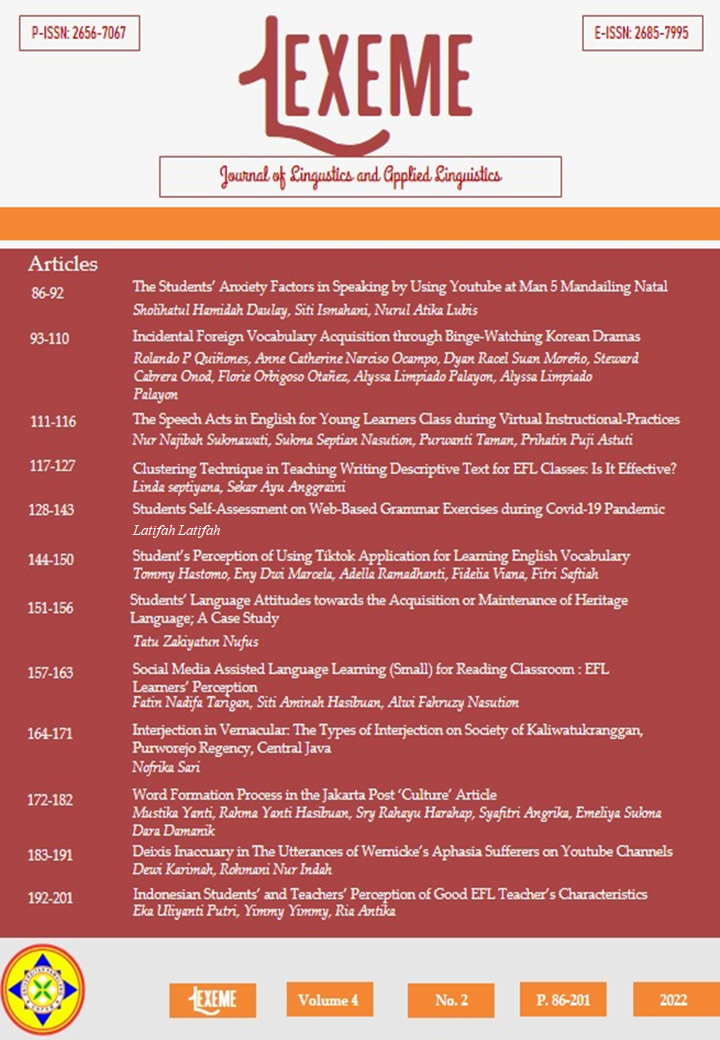INDONESIAN STUDENTS’ AND TEACHERS’ PERCEPTION OF GOOD EFL TEACHER’S CHARACTERISTICS
DOI:
https://doi.org/10.32493/ljlal.v4i2.20606Keywords:
Teacher Characterisctic, English Foreign Language, Teachers preceptions, Students Perceptions.Abstract
This research is aimed at knowing the results from the students’ perception regarding the good characteristics teacher whether English teachers have fulfilled the good teacher characteristic and also knowing the teacher’s view on the characteristics of being good EFL teacher. This research also aims at providing anyone concerned with ELF learning and teaching process, with a much better view so that there will be a more understanding toward the ideal figure that should be possessed by the teacher. This research is conducted in into a few subjects ( 7 EFL teacher and approximately 80 students) in a certain time or period thus the result will just represent the point of view of the students and their teacher in that specific time. Since survey research requires large amount of data. The research was conducted in Global Institute and Polytechnic LP3I tangerang. The researchers use two questionnaire to gain the data. This research has purpose that teachers could know their students perception and opinions about themselves. The result shows that teachers must have four aspects, they are technical knowledge, pedagogical skills, personal and interpersonal skills. So, the teachers can implement those aspects to encourage students to get involved in teaching learning processReferences
Al-Darwish, S. (2012). The role of teacher questions and the socratic method in EFL classrooms in Kuwait. World Journal of Education, 2, (4). 76-84.
Al-Mahrooqi, R., Denman, C., Al-Siyabi, J., & Al-maamari, F. (2015). Characteristics of a good EFL teacher: Omani EFL teacher and students perspectives. SAGE Open. DOI: 10.1177/2158244015584782. Retrieved from: http://sgo.sagepub.com/content/5/2/2158244015584782.full-text.pdf+html
Baytur, B., & Razı, S. (2015). Characteristics of effective EFL teachers from the perspective of Turkish EFL learners. International Journal of Human and Behavioral Science, 1(2).
Borg, S. (2006). The distinctive characteristics of foreign language teachers. Language Teaching Research, 10. 3-31.
Brosh, H. (1996). Perceived characteristics of the effective language teacher. Foreign Language Annals, 29(2), 125-136.
Brown, H. D. (2007). The teaching by principles: From theory to practice. New York: Pearson. Choi, H. Y., & Lee, W. H. (2008). Current trends and issues in English language education in
Asia. THE JOURNAL OF ASIA TEFL, 5, (2). 1-34. Retrieved from: http://www.asiatefl.org/main/download_pdf.php?i=262&c=1419312102.
Clotfelter, C., Ladd, H., & Vigdor, J. (2007). Teacher Credentials and Student Achievement in
High School: A Cross-Subject Analysis with Student Fixed Effects. http://www.caldercenter.org/PDF/1001104_Teacher_Credentials_HighSchool.pdf
Crystal, D. (1997). English as a global language. (2nd ed.). Cambridge: Cambridge University Press.
Da Luz, F. S. D. R. (2015). The Relationship between Teachers and Students in the Classroom: Communicative Language Teaching Approach and Cooperative Learning Strategy to Improve Learning. In BSU Master’s Theses and Projects. Item 22. Available at http://vc.bridgew.edu/theses/22
Dincer, A., Göksu, A., Takkaç, A., & Yazici, M. (2013). Common characteristics of an effective English language teacher. International Journal of Educational Researchers, 4(3), 1-8.
Frankel, J. R., & Wallen, N. E. (2006). How to design and evaluate research in education. New York: Pearson.
Harmer, J. (2001). The practice of English language teaching. London: Pearson.
Lauder, A. (2008). The status and function of English in Indonesia: A review of key factors. MAKARA, SOSIAL HUMANIORA, 12, (1). 9-20.
LeBlanc, J. C. (1997). The fundamentals of second language teaching. Mosaic, 5, (1). 3-8. Liando, N. V.F. (2010). Students’ vs. teachers’ perspectives on best teacher characteristics in EFL classroom. TEFLIN Journal, 21, (2). 118-136.
Macaro, E. (1997). Target Language, Collaborative Learning and Autonomy. Clevedon: Multilingual Matters.
Madya, S. (2002). Developing standards for EFL in Indonesia, TEFLIN, 13, (2). 142-151
Neil, S. (1991). Classroom nonverbal communication. London: Routledge.
Pettis, J. (1997). Developing our professional competence: Some reflections.TESL Canada Journal, 14(2), 67-71.
Queensland College of Teacher, (n.d.). Meaning of Teacher. Retrieved from: http://www.qct.edu.au/renewal/MeaningOfTeacher.html
Rido, A., Ibrahim, N., & Nambiar, N.M.K. (2013). Investigating EFL master teacher’s classroom interaction strategies: A case study in Indonesian secondary vocational school. Procedia – Social and Behavioral Sciences, 188. 420-424.
Shah, S. (2015). Sociocultural issues in learning English for women in Northwest Pakistan.Unpublished Dissertation. University of Berlin.
Stronge, J.H. (Ed.). (2006). Evaluating teaching. Thousand Oaks, CA: Corwin Press. Wedell, M., & Malderez, A. (2013). Understanding language classroom contexts: The starting point for change. New York: Bloomsbury Publishing.
Williams, M., & Burden, R. L. (1997). Psychologyfor language teachers.Cambridge: CambridgeUniversityPress.
Wichadee, S. (2010). Defining the effective English language teacher: Students’ and teachers’perspectives. In A. M. Stoke (Ed.), JALT2009 Conference Proceedings. Tokyo: JALT.
Yu, Y. (2010). Attitudes of learners toward English: A case of Chinese college students.Unpublished Doctoral Dissertation. Graduate School of Education. The Ohio State University. retrieved from: https://etd.ohiolink.edu/!etd.send_file?accession=osu1283303545&disposition=inline
Zacharias, N. T. (2003). A survey of tertiary teachers’ beliefs about English language teaching in Indonesia with regard to the role of English as a global language. Unpublished MA-ELT Thesis. Retrieved from: http://asian-efl-journal.com/thesis_N_Zacharias.pdf
Zoltán, D. (2007). Research methods in applied linguistics: Quantitative, qualitative, and mixed methodologies. Oxford University Press.







